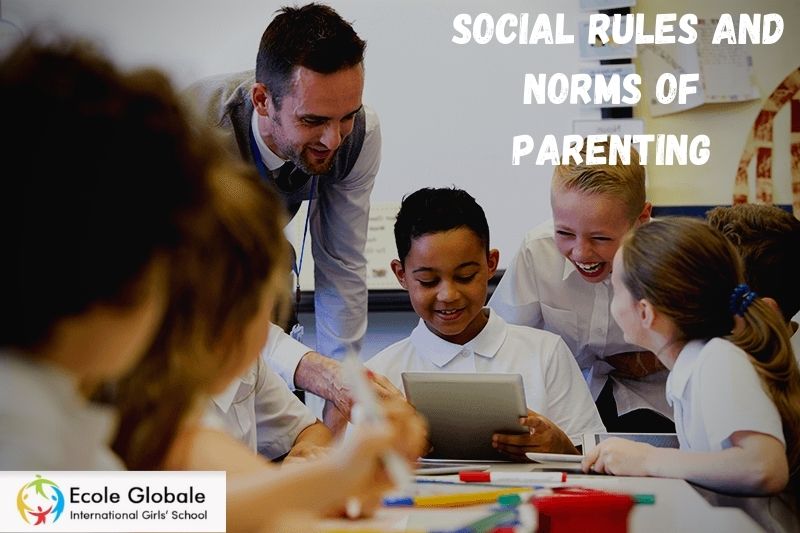Human society, as we all know, is filled with different social rules and norms for every individual. Similarly, there are some rules and norms under the parenting environment, where some are widely addressed, and some fall under the unspoken category. And no you didn’t misspell anything, there are some rules and norms under parenting that are not widely addressed (unspoken) but followed. So the unspoken, yet followed standards and rules are the elephants in the room.
An interesting characteristic of these unspoken rules & norms is that they are never taught to anyone. An effective parenting style has a huge effect on kids. Individuals get these dos and don’ts on their own. They instinctively know what they should follow and what to avoid. This article is about exploring such invisible boundaries. We’ll begin with the unspoken rules and then move on to the norms of parenting
.
Rules –
the rules in this context are more of the stereotypical guidelines to be followed, which ultimately became a universal set of rules.
- Dads to be successful – it is a very typical stereotype of thinking that our dads should always be the best in their job. And their job should be one of a kind that we can speak about, not being awkward.
- Dads are the breadwinner – another parenting stereotype we follow is the idea of our dads as our only breadwinners. Which further becomes a rule, only for the sons to be the earning member of the family.
- Moms are the official household-manager – this one is probably the most common stereotype of perceiving our moms as the official household managers. Due to this, it becomes a rule for every girl to learn all household chores possible, but not for the boys.
While for us (kids), our moms being our household manager is true to some extent, but that doesn’t mean we take for granted their organization skills and think of it as a mom’s-doing.
- Males have to be less emotional – the idea of men being emotional is always put a cross mark on. Boys are always directed not to cry even in pain, which further goes into the making of a habit of not ever being sensitive.
- Dads are the kid-spoilers – this is a very typical ideology developed mostly through movies/tv shows, of dads being less able to handle the kids and that it’s a mom’s job. But that can’t be typical, working moms to face difficulty in handling kids. Spending more time with kids can aid in handling them better, to both, moms as well dads.
- Working moms – working moms, this title itself is not accepted. Since moms are always perceived as housewives and as managing the kids. But now, this ideology is rapidly changing, moms (women) now believe that they can work too, there ain’t special a tag for household-manager for anyone. But then, this good shift of idea gave birth to another stereotype. Which is off, single mothers that single-handedly work and support their kids are lonely, financially unstable, and always need help.
- Sons are the protectors of their sister – this idea is not a flaw, of the sons of a family protecting their sister, rather it is an incomplete ideology that leads to another stereotype. No one talks about the daughter protecting their brothers, neither the parents nor the daughters (mostly not even a matured woman). This creates another stereotype-cum-rule that the males need to be protective of the females, and the females are weak.
- Hobby/profession – our next stereotype is regarding the hobbies and professions of different gender viz, sons & daughters. The idea says that the sons should be into sports, and the daughters should be into baking, cooking, knitting, and all other stuff that we tag as girly.
- Difference – this difference is not between the gender, but among all the kids of different colors, races, caste, and classes. The thing is, these classifications are termed as differences, which further are never discussed by the parents. Due to this, the kids instinctively attain the idea of racism, color difference, and class & caste superiority, which should actually never happen.
Norms –
norms are traditional standards that are set over the course of time. Here, we’ll look at the topics that the kids or parents don’t talk about in parenting.
- Love relationships – it is a very typical practice of the kids not talking about any of their love relationships, with their parents. None of the kids talk, discuss or even share about their love life with their parents.
- Sex – neither parents, not the kids talk about sex in the house. This idea of not talking about sex is normalized to a great extent, due to which, the kids of all generations hit puberty through very immature means.
- Mistakes – kids always tend to hide mistakes from their parents, and the reason is their parent’s aggressive reactions. Hence, the kids never even share the mistakes that they made outside the house, and take immature help from their friends.
- What’s bothering them – this is another point that is in context to both, kids and parents. Neither of them ever shares about what’s bothering or troubling them, they just seem to take it all on their own.
- Financial problem – definitely needs no explanation, parents never share their financial problems with their kids. They don’t even just talk about it, which makes the kids believe that their financial problems are not to be discussed with anyone.
- New experiences – the new experiences are in reference to the kids. The kids encounter some experiences that are very new to them while being with the peer group, which may involve consumption of alcohol, drugs, or smoking, and they never let their parents know of it. This leads to an extreme level of immature assistance for its use by their friends.
- Personal mental health – this can be noticed in parenting as well as the whole society. Nobody talks about their mental health, not even to themselves. Everyone makes themself forcefully believe that they’re okay, even if they might be depressed, anxious or panicked. Everybody wants to appear okay upfront.
Winding up the topic, these are some of the rules & norms involved in parenting, that is not talked about, but followed, of course, some by parents and some by the kids. These rules & norms have become a tradition. And again, they’re the elephant in the room.









